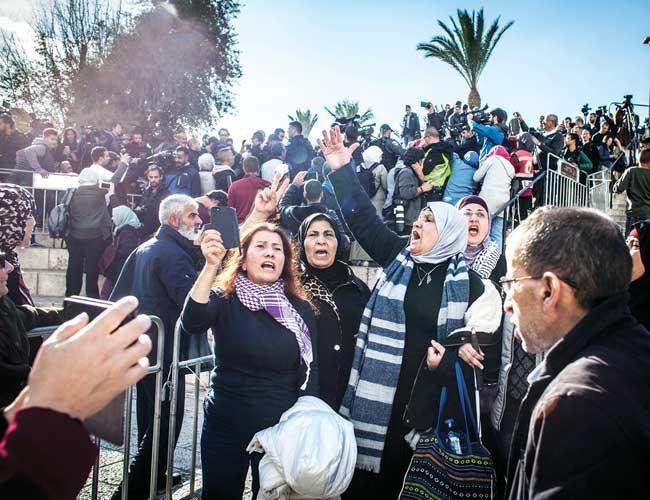
Palestinians’ expectations have risen following the Organization of Islamic Cooperation’s (OIC) recent recognition of East Jerusalem as the capital of the State of Palestine. They have expressed a wish that Muslim-majority countries remain united on the decision and move their embassies to Jerusalem.
The 57-member OIC had recognized East Jerusalem as the capital of the State of Palestine on Dec. 13 during an extraordinary summit in Istanbul, responding to the U.S.’s recognition of Jerusalem as the “undivided” capital of Israel.On Dec. 14, Turkey named East Jerusalem as the capital of Palestine on its website.
Almost everyone we came across in East Jerusalem applauded the OIC decision, while stressing that it should be followed up with support in the international arena.
“Jerusalem has always been the capital of the Palestinians and will continue to be so,” said journalist Liwaa Aburmeilah, adding that she “appreciates Turkey’s defense of the Palestinian struggle.”
“However, this should be voiced in international platforms. It should not just stay at the discourse level. All countries should move their embassies to East Jerusalem,” Aburmeilah said.
Mazin, a shopkeeper from East Jerusalem, criticized Arab countries.
“They should not just make this call, we expect them to raise their voices in international organizations,” he said.
‘International administration’
A Syriac Christian shopkeeper in the city’s old town was reluctant to speak to reporters but said his family had been living in Jerusalem for over a century.
“It is a delicate subject and we are a community with only a few people left,” he said.
Nearby, fellow Christian Sajda was more forthcoming.
“Jerusalem belongs to the members of three religions. For this reason it should be under international administration. Jerusalem should belong to everybody,” he said.
Sajid, who has lived in the old town for 26 years, said the Palestinians have lost hope and do not trust their own administration, which is why participation in protests has been relatively low.
“For what purpose, for what ideal should we send our children to death?” he said.
“I do not have hope from Arab countries. I don’t think Arab countries will move their embassies here either,” he added.
Turkey has had a consulate in Jerusalem since 1925
There are currently 10 diplomatic missions in East Jerusalem, including Turkey’s, and Israel is unable to intervene because they were opened in Jerusalem under British rule before 1948.
Turkey’s Jerusalem General-Consulate functions as Ankara’s political representation in the city. It was opened in 1925 and currently coordinates Turkey’s relationship with the Palestinian authorities. Experienced diplomat Gürcan Türkoğlu is currently representing Turkey at the Jerusalem Consulate.
The international community, including the U.S., acknowledges that Israel occupies East Jerusalem, in line with the relevant U.N. Security Council resolutions. The countries that recognize Israel have their embassies in Tel Aviv, even though all Israeli state offices are located in Jerusalem.
Turkish flag at al-Aqsa Mosque
In the second Friday prayer since U.S. President Donald Trump decided to recognize Jerusalem as the undivided capital of Israel, protests were staged across Palestine, in occupied East Jerusalem, the West Bank, Gaza and some Arab-majority towns inside Israeli territories.
During the protests at the al-Aqsa Mosque, a Turkish flag was unfurled by group chanting “Jerusalem belongs to the Palestinians.” The flag was unfurled by a group of 30 men from the Eskişehir Industrialists and Businessmen Association, who had come to Jerusalem to take part in the protests.
“These are our territories. We will not abandon them. We don’t approach this issue through a political perspective but as Muslims. Jerusalem belongs to us and will remain so,” Murat Kökten from the group told the Hürriyet Daily News on Dec. 15.
Police intervention
Israeli security forces took stringent measures in front of the Damascus Gate to the old city and intervened in a number of protests throughout the day. Palestinians who wanted to reach the al-Aqsa Mosque for Friday prayers had to pass through a corridor between barriers to reach the complex.
As non-Muslims are forbidden to enter the Harem-I Serif, Palestinian security forces checked the passports of prospective worshippers and asked them to recite verses from the Quran to confirm they were Muslims.